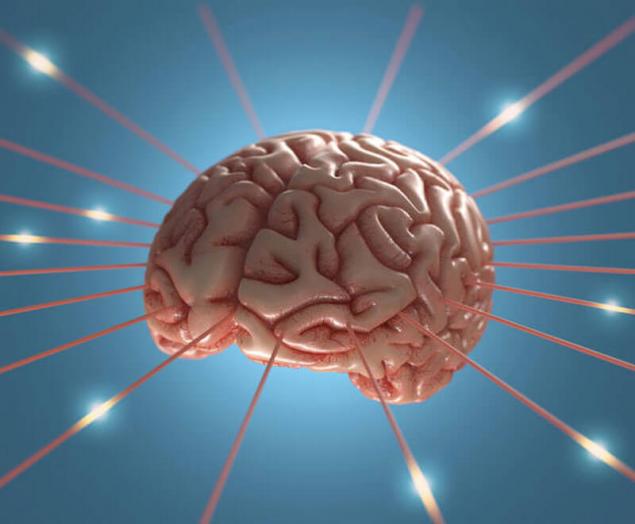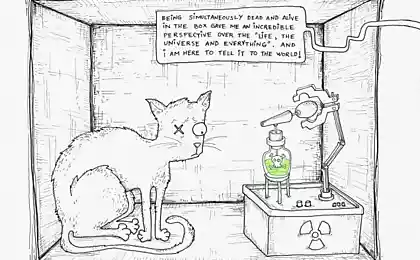435
Schrödinger's cat in mind: why our brain is like a quantum field
One of the most ambitious goals of modern science to create a computer model of the human brain. In order to try to accurately reproduce the activity of neurons, requires a whole system of parallel machines. But what if the analogy with the computer is not too accurate, and the thinking process are best described in terms of quantum physics? The American writer Daphne Muller asks you to think about this article on the website Big Think.
The irrational organization of the human psyche — long beach psychology. When someone asks how you doing, we respond either "fine" or "good." But if then there is a question about a specific event — "today was your meeting with the boss?" — our answers are much more varied, it can be "horrible," and "amazing".

After saying two sentences, we're contradicting yourself: things are "normal", but a meeting with the chief, we believe in complete failure. As, in this case, everything can be okay? For each emotional expression and each decision that we take, is affected by a complex combination of our preconceptions, experience, knowledge and context. This happens on a conscious and on an unconscious level. To predict human behavior is incredibly difficult, and probability this is not the best helper.
Introduction to the quantum theory of consciousness: a team of researchers found that our decisions and beliefs often do not fit in any logic at the macro level, while the "quantum" level of human behavior can be predicted surprisingly accurately. In quantum physics the act of observing a particle affects its condition — and in psychology, the "observer effect" influences our attitude toward a particular idea.
The brain "plays dice" with our "vague" ideas, perceptions, and tendencies to form several conflicting thoughts, opinions or points of view
Back to our example: if the person asks, "everything went Well", we begin to look to the recent events of positive aspects. But if the question sounds like "were You nervous before the meeting?", we immediately recall shaking knees and trembling voice during a speech in front of colleagues. Another concept that brain researchers borrowed from quantum physics — the inability to simultaneously hold in mind contradictory ideas. In other words, the process of decision-making and opinion-forming resembles the experiment with schrödinger's cat.
Quantum theory of cognition have influenced the understanding of brain mechanisms in psychology and neuroscience research: now it is believed that the brain is more like a computer, and a separate universe with its original device. However, the idea of the paradoxical nature of human thinking and existence of our species as a whole is not new — it has been developing for several centuries. Studying the irrational mechanisms of our thinking, researchers often turn to the contradictory allegations on which are based all the religions of the world. For example, one of the foundations of Buddhism is the principle of "Calmness is within you. Don't look for it in the outside world". In Christianity one of the main pillars of faith is the paradoxical nature of Christ — he is both the Son of God and a man of flesh and blood. The idea that outside of our traditional ideas surrounding reality starts to fall apart for centuries were developed in the religious texts. At the same time, only through conflict we can learn something new about the world and about themselves.
In the old Testament there is an episode where job cries out to God asking why his life had so much suffering. The Lord responds to job by a mysterious question: "Where were you when I laid the earth's Foundation?" (book of job 38:4). This remark seems completely pointless — what God asks of man, his creation, where he was when God created the world? But this phrase is no more paradoxical than in the famous criticism of the "uncertainty principle" of Heisenberg as expressed in a phrase of Einstein "God does not play dice." Stephen Hawking objected to Einstein, saying that "even God obeys the uncertainty principle", as if all the results of his creation was predestined, God would not be God. According to Hawking, God is "an avid player of dice", and it is this quality that determines the possibility of its existence.
According to quantum theory of mind, the brain "plays dice" with our "vague" ideas, perceptions, and tendencies to form several conflicting thoughts, opinions or points of view. He then synthesizes these ideas in a relatively homogeneous "certain" view of reality. Monitoring thinking on a quantum level leads to its transformation, and this, in turn, changes the surrounding reality, which determines our consciousness. published
P. S. And remember, only by changing their consumption — together we change the world! © Join us at Facebook , Vkontakte, Odnoklassniki
Source: theoryandpractice.ru
The irrational organization of the human psyche — long beach psychology. When someone asks how you doing, we respond either "fine" or "good." But if then there is a question about a specific event — "today was your meeting with the boss?" — our answers are much more varied, it can be "horrible," and "amazing".

After saying two sentences, we're contradicting yourself: things are "normal", but a meeting with the chief, we believe in complete failure. As, in this case, everything can be okay? For each emotional expression and each decision that we take, is affected by a complex combination of our preconceptions, experience, knowledge and context. This happens on a conscious and on an unconscious level. To predict human behavior is incredibly difficult, and probability this is not the best helper.
Introduction to the quantum theory of consciousness: a team of researchers found that our decisions and beliefs often do not fit in any logic at the macro level, while the "quantum" level of human behavior can be predicted surprisingly accurately. In quantum physics the act of observing a particle affects its condition — and in psychology, the "observer effect" influences our attitude toward a particular idea.
The brain "plays dice" with our "vague" ideas, perceptions, and tendencies to form several conflicting thoughts, opinions or points of view
Back to our example: if the person asks, "everything went Well", we begin to look to the recent events of positive aspects. But if the question sounds like "were You nervous before the meeting?", we immediately recall shaking knees and trembling voice during a speech in front of colleagues. Another concept that brain researchers borrowed from quantum physics — the inability to simultaneously hold in mind contradictory ideas. In other words, the process of decision-making and opinion-forming resembles the experiment with schrödinger's cat.
Quantum theory of cognition have influenced the understanding of brain mechanisms in psychology and neuroscience research: now it is believed that the brain is more like a computer, and a separate universe with its original device. However, the idea of the paradoxical nature of human thinking and existence of our species as a whole is not new — it has been developing for several centuries. Studying the irrational mechanisms of our thinking, researchers often turn to the contradictory allegations on which are based all the religions of the world. For example, one of the foundations of Buddhism is the principle of "Calmness is within you. Don't look for it in the outside world". In Christianity one of the main pillars of faith is the paradoxical nature of Christ — he is both the Son of God and a man of flesh and blood. The idea that outside of our traditional ideas surrounding reality starts to fall apart for centuries were developed in the religious texts. At the same time, only through conflict we can learn something new about the world and about themselves.
In the old Testament there is an episode where job cries out to God asking why his life had so much suffering. The Lord responds to job by a mysterious question: "Where were you when I laid the earth's Foundation?" (book of job 38:4). This remark seems completely pointless — what God asks of man, his creation, where he was when God created the world? But this phrase is no more paradoxical than in the famous criticism of the "uncertainty principle" of Heisenberg as expressed in a phrase of Einstein "God does not play dice." Stephen Hawking objected to Einstein, saying that "even God obeys the uncertainty principle", as if all the results of his creation was predestined, God would not be God. According to Hawking, God is "an avid player of dice", and it is this quality that determines the possibility of its existence.
According to quantum theory of mind, the brain "plays dice" with our "vague" ideas, perceptions, and tendencies to form several conflicting thoughts, opinions or points of view. He then synthesizes these ideas in a relatively homogeneous "certain" view of reality. Monitoring thinking on a quantum level leads to its transformation, and this, in turn, changes the surrounding reality, which determines our consciousness. published
P. S. And remember, only by changing their consumption — together we change the world! © Join us at Facebook , Vkontakte, Odnoklassniki
Source: theoryandpractice.ru























